Public holidays in the United States
The schedule of public holidays in the United States is largely influenced by the schedule of federal holidays but is controlled by private sector employers who provide 62% of the total U.S. population with paid time off.
| Public holidays in the United States | |
|---|---|
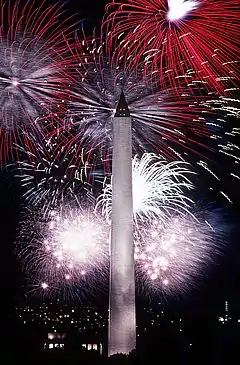 | |
| Observed by | Federal government State governments Local governments Private and public sector employers |
| Type | National |
Public holidays with paid time off is generally defined to occur on a day that is within the employee's work week. When a holiday occurs on Saturday or Sunday, that holiday is shifted to either Friday or Monday for work purposes. Most employers follow a holiday schedule similar to the federal holidays of the United States, with exceptions or additions. The federal holiday schedule mainly benefits employees of government and government regulated businesses; however, this sector only comprises 15% of the working population.
At the discretion of the employer, other non-federal holidays such as New Year's Eve, Christmas Eve and the Day after Thanksgiving are common additions to the list of paid holidays while Columbus Day and Veterans Day are common omissions. Besides paid holidays, there are festival and food holidays that also have wide acceptance based on sales of goods and services that are typically associated with that holiday. Halloween and Valentine's Day are examples of widely celebrated uncompensated holidays.
History
Public holidays had their origins from established federal holidays that were enacted by Congress. They were typically observed on days that have significance for various sectors of American society and are observed at all levels of society, including government and the private sector. These holidays are typically derived from the history, religions, and cultures of the United States and have changed over time. Major holidays are most commonly observed with paid time off, however, many other holiday celebrations come without time off.
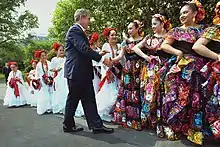
There are no national holidays on which the law requires all businesses to close. Federal holidays are only established for certain federally chartered and regulated businesses, government contractors, and the city of Washington, DC. All other public holidays are created by the States; most states also allow local jurisdictions (cities, villages, etc.) to establish their own local holidays. As a result, holidays have not historically been governed at the federal level and federal law does not govern business openings.
Some states, however, do restrict certain business activities on some holidays.[1] Business closures are mandated on a few holidays in some states for certain kinds of businesses by blue laws. For example, businesses that operate on more than 5,000 square feet (460 m2) cannot open on Thanksgiving in some New England states. The most notable businesses to close on such occasions are car dealerships and liquor stores. Some holidays are observed with community service, depending on the meaning of the holiday. Service is, however, not mandated by any government agencies, whether they be federal, state, or local.
Overview
As of 2019, there are ten annual federal holidays in the United States, and one additional quadrennial holiday (Inauguration Day).[2] Pursuant to the Uniform Monday Holiday Act of 1968 (effective 1971), official holidays are observed on a Monday, except for New Year's Day, Independence Day, Veterans Day, Thanksgiving, and Christmas.[3]

While all current federal holidays have also been made public holidays in all 50 states, each state is not bound to observe the holidays on the same dates as the federal holidays. Many states also have additional holidays that are not observed by the federal government.[4] Many businesses likewise observe certain holidays as well, which are also not mandated by any government agency.
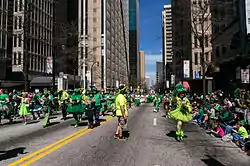
Since 2000, some city and state-level celebrations of Malcolm X Day and Rosa Parks Day have been created, in addition to the federal Martin Luther King Jr. Day, to embrace the African American community in the form of festivals and parades. Illinois and Berkeley, California are two places where Malcolm X is honored by a legal holiday with offices closed, whereas Missouri honors Rosa Parks on her birthday.[5][6] Today, the United States is the 85th most ethnically diverse country in the world. Many workplaces celebrate religious observance as well as ethnic holidays, such as Saint Patrick's Day, Kwanzaa, Diwali, Mardi Gras, and Cinco de Mayo, as a matter of best practice.[7]
While the popularity of each public holiday cannot easily be measured, the holiday with the highest greeting card sales is Christmas.[8] Major retail establishments, such as shopping malls and centers, close only on Thanksgiving and Christmas, but remain open on all other holidays (with early closings on Christmas Eve and New Year's Eve, and sometimes on other major holidays). In the face of a rapidly tightening retail market in the 2010s, retailers have increasingly been opening on Thanksgiving evening and night to extend Black Friday and the holiday shopping season.[9] Virtually all large companies observe and close on the major holidays (New Year's Day, Memorial Day, Independence Day, Labor Day, Thanksgiving, and Christmas). Some non-retail businesses close on the day after Thanksgiving, while others (such as federal banks and post offices) are not allowed to close that day. Some smaller businesses normally open on Sundays will close on Easter Sunday if they expect to have very few customers that day.[10]
Holidays most commonly celebrated
This is a list of the most commonly celebrated holidays in the United States, not a list of federal holidays.
| Rank | Date | Holiday | % of Americans celebrating | USD sales (in billions)[11] | Main Symbols | Description |
|---|---|---|---|---|---|---|
| 1 | December 25 (Fixed) | Christmas | 92–96% [12][13][14][15] | $630.5 | Many Christmas carols and popular songs, Christmas trees, gift-giving, decorations, Santa Claus, Christmas dinner, shopping, church services | Christmas is the celebration of Jesus' birth. Celebrations are marked by decorations and exchanging of gifts between family members and friends. Most popular holiday based on greeting card sales. Also known for having the second highest church attendance (behind Easter). Widely celebrated as a secular holiday. |
| 2 | November 22–28 (Floating Thursday) | Thanksgiving | 87–90% [16][17] | (part of Christmas sales) | Giving thanks, prayer, feasting, spending time with family, football games, parades, turkey, "Alice's Restaurant", traveling | Thanksgiving is a celebration of thanks for the previous year, with families and friends gathering for a large meal or dinner. Consequently, the Thanksgiving holiday weekend is one of the busiest travel periods of the year.[18] One-sixth of the turkeys consumed annually in the U.S. are eaten around Thanksgiving.[19][20] |
| 3 | May 8–14 (Floating Sunday) | Mother's Day | 84% [21][22] | $19.9 | Breakfasts in bed, family meals, gift-giving, flowers | Mother's Day recognizes mothers, motherhood, and maternal bonds in general, as well as the positive contributions that they make to society. Known for having the highest restaurant sales, even compared with Valentine's Day, as well as the highest church attendance after Easter and Christmas.[23][24] |
| 4 | March 22 – April 25 (Floating Sunday) | Easter | 80–81% [25][26] | $16.4 | Church services, family meals, Easter egg decorating, egg hunts, the Easter Bunny, Easter parades, Easter baskets, chocolates | Easter commemorates the resurrection of Jesus from the dead. The highest church attendance happens on Easter.[24] Like Christmas, it has become a widely celebrated secular holiday, and customs observed by both Christians and some non-Christians include egg hunting, the Easter Bunny, and Easter parades. |
| 5 | July 4 (Fixed) | Independence Day (Fourth of July) | 78–79% [27] | $68.0 (Part of Back to School sales) | Fireworks, family reunions, concerts, barbecues, picnics, parades, baseball games, carnivals and fairs | Independence Day, also commonly known as the Fourth of July, marks the date that the Declaration of Independence was adopted in 1776. The holiday is best known for fireworks and barbecues. 45% of American celebrate the 4th of July with fireworks, accounting for about $675 million in fireworks sales.[28] |
| 6 | June 15–21 (Floating Sunday) | Father's Day | 75% [29] | $12.7 | Family meals, gift-giving | Father's Day is a celebration honoring fathers and celebrating fatherhood, paternal bonds, and the influence of fathers in society. It accounts for the highest sales of ties and neckwear annually, around $12.7 billion.[30] |
| 7 | October 31 (Fixed) | Halloween | 64–65% [31][32] | $6.9 | Trick-or-treating, costume parties, carving jack-o-lanterns, lighting bonfires, visiting haunted attractions, horror movies | Halloween celebrations are marked by costumed children knocking door to door asking for treats, and costumed adults attending parties. The most popular holiday for candy sales, amounting to $2.6 billion in 2015.[33] The same year, $6.9 billion was spent on candy, costumes, and pumpkins, all of which are directly attributed to this holiday.[34] |
| 8 | February 14 (Fixed) | Valentine's Day | 55% [35] | $18.9 | Sending greeting cards, gift-giving, dating and romantic dinners, church services, candy, flowers | Valentine's Day is recognized as a significant cultural, religious, and commercial celebration of romance and romantic love. It accounts for 224 million roses grown annually. 24% of American adults purchased flowers for Valentine's Day in 2015.[36] The holiday comes in second in terms of annual restaurant sales, behind Mother's Day.[23] |
| 9 | March 17 (Fixed) | Saint Patrick's Day | 51% [37] | $4.4 | Parades, parties, shamrocks, leprechauns, display of the color green, Irish beer and Irish whiskey, corned beef, copious consumption of alcohol | Saint Patrick's Day commemorates Saint Patrick and the arrival of Christianity in Ireland, and celebrates the heritage and culture of the Irish in general. Celebrations generally involve public parades and festivals, parties, the wearing of green attire or shamrocks, and alcohol consumption. |
| 10 | December 31 (Fixed) | New Year's Day (New Year's Eve) | 37–45% [38][39] | (Part of Christmas sales) | Making New Year's resolutions, church services, parades, football and hockey games, fireworks | Observed on January 1, the first day of the year on the modern Gregorian calendar as well as the Julian calendar. Known for being the holiday with the highest alcohol consumption, evidenced by the spike in sales around between Christmas Eve and New Year's Eve.[40][41] |
Holidays observed with paid time off
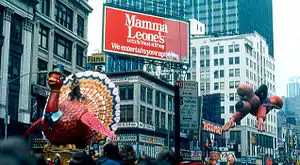
The labor force in the United States comprises about 62% (as of 2014) of the general population.[42] In the United States, 97% of the private sector businesses determine what days this sector of the population gets paid time off, according to a study by the Society for Human Resource Management. The following holidays are observed by the majority of U.S. businesses with paid time off:
Holidays with religious significance

Religious and cultural holidays in the United States are characterized by a diversity of religious beliefs and practices. However, the First Amendment to the United States Constitution provides that "Congress shall make no law respecting an establishment of religion, or prohibiting the free exercise thereof...." and Article VI specifies that "no religious Test shall ever be required as a Qualification to any Office or public Trust under the United States." As a result, various religious faiths have flourished, as well as perished, in the United States. A majority of Americans report that religion plays a "very important" role in their lives, a proportion unique among developed nations.[44]
The majority of Americans (73–80%) identify themselves as Christians and about 15–20% have no religious affiliation.[45] According to the American Religious Identification Survey (ARIS) (2008) 76% of the American adult population identified themselves as Christians, with 51% professing attendance at a variety of churches that could be considered Protestant or unaffiliated, and 25% professing Catholic beliefs.[46] The same survey says that other religions (including, for example, Islam, Judaism, Buddhism, and Hinduism) collectively make up about 4% of the adult population, another 15% of the adult population claim no religious affiliation, and 5.2% said they did not know, or they refused to reply. According to a 2012 survey by the Pew forum, 36 percent of Americans state that they attend services nearly every week or more.[47]
Christian holidays
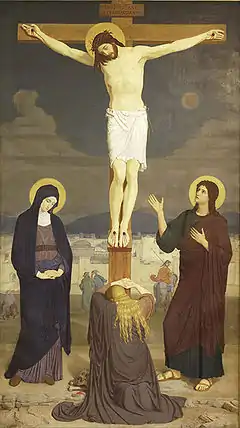
With 73% of the U.S. population identifying themselves as Christian, many holidays from the liturgical calendar are observed by this segment of the population. With 94% of businesses including federal, state, and local governments closing on Christmas, arguably the most significant holiday of the Christian religion, many stores are also closed on Christmas, but with a relatively small exception. For example, convenience stores operating on less than 5,000 square feet of space such as 7-Eleven and CVS Pharmacy can remain open.[48] A reference in A Christmas Story shows a Chinese restaurant being the only establishment open on Christmas.
Some private businesses and certain other institutions are closed on Good Friday.[49] The financial market and stock market is closed on Good Friday.[50] Most retail stores remain open although some might close early. Public schools and most universities are closed on Good Friday, either as a holiday of its own, or part of spring break. The postal service operates, and banks regulated by the federal government do not close for Good Friday.[2]
Many companies, including banks, malls, shopping centers, and most private retail stores that normally open on Sundays are closed on Easter.[10]
| Date | Name | Remarks |
|---|---|---|
| January 6 | Epiphany | Epiphany (from Greek epiphaneia, "manifestation"), falls on the 12th day after Christmas. It commemorates the manifestation of Jesus Christ to the Gentiles, as represented by the Magi, the baptism of Jesus, and the miracle of the wine at the marriage feast at Cana. One of the three major Christian festivals, along with Christmas and Easter. Epiphany originally marked the beginning of the carnival season preceding Lent, and the evening preceding it is known as Twelfth Night. |
| January 7 | Orthodox Christmas | January 7th is the Gregorian Calendar equivalent of December 25 on the Julian Calendar still observed by the Russian and other Eastern Orthodox Churches. |
| February 3 – March 9 (floating Tuesday using Computus) | Mardi Gras and Ash Wednesday | A festive season (Carnival) leading up to Shrove Tuesday or Mardi Gras. Closes with Ash Wednesday (40 days before Easter, not counting Sundays), which starts the penitential season of Lent in the Western Christian calendar. |
| February 14 | Valentine's Day | St. Valentine's Day, or simply Valentine's Day is named after one or more early Christian martyrs named Saint Valentine and was established by Pope Gelasius I in 496 AD. Modern traditional celebration of love and romance, including the exchange of cards, candy, flowers, and other gifts. |
| March 15 – April 18 (floating Sunday using Computus) | Palm Sunday | Celebration to commemorate the entry of Jesus into Jerusalem. |
| March 17 | St. Patrick's Day | A holiday honoring Saint Patrick that celebrates Irish culture. The primary activity is simply the wearing of green clothing ("wearing o' the green"), although drinking beer dyed green is also popular. Big parades in some cities, such as in Chicago, where there is also a tradition of dyeing the Chicago River green. |
| March 20 – April 23 (floating Friday using Computus) | Good Friday | Friday of Holy Week, when Western Christians commemorate the crucifixion and death of Jesus. Good Friday is a holiday in some individual counties and municipalities, as well as a state holiday in Connecticut,[51] Delaware,[52] Florida,[53] Hawaii,[54] Indiana,[55] Kentucky,[56] Louisiana,[57] New Jersey,[58] North Carolina,[59] North Dakota,[60] Tennessee[61] and Texas.[62] State and local government offices and courts are closed, as well as state-chartered banks and in these jurisdictions. Federal banks and post offices that are located in buildings that close for Good Friday and Easter will also be closed. Good Friday is also a holiday in Guam,[63] U.S. Virgin Islands[64] and Puerto Rico.[65] Many public and private schools, colleges, universities and private-sector businesses; and the New York Stock Exchange and financial markets are closed on Good Friday. |
| March 22 – April 25 (floating Sunday using Computus) | Easter | Celebration of the resurrection of Jesus in most Western Christian churches. A minority of Protestant churches do not observe Easter. Eastern Orthodox (including Western Rite), Oriental Orthodox and some Neo-Celtic churches observe Easter according to a different calendar, usually on a later Sunday (thus they also observe Palm Sunday and Good Friday on different days than Western Christians).
Many Americans decorate hard-boiled eggs and give baskets of candy, fruit, toys, and so on, especially to children; but gifts of age-appropriate Easter baskets for the elderly, the infirm, and the needy are increasingly popular. An annual Easter Egg Roll has been held at the White House South Lawn for young children on Easter Monday since President Hayes started the tradition in 1878.[66] Not a federal holiday due to the fact that it always falls on a Sunday, which is a non-working day for federal and state employees. Many companies that are normally open on Sunday close for Easter. |
| October 31 | Halloween | Originally the end of the Celtic year, it now celebrates Eve of All Saint's Day. Decorations include jack o'lanterns. Costume parties and candy such as candy corn are also part of the holiday. Kids go "trick-or-treating" to neighbors who give away candy. It is not generally observed by businesses and is one of the most popular holidays in the US. |
| December 8 | Immaculate Conception of the Virgin Mary | Immaculate Conception is a dogma of the Catholic Church maintaining that the Virgin Mary was kept free of original sin from her moment of conception. Companies in some states will give day off to their employees. |
| December 24 | Christmas Eve | Day before Christmas. Virtually every business closes early, though some remain open. |
| December 25 | Christmas | Is a federal holiday. |
Hindu holidays

The Hindu holidays of Diwali and Holi are celebrated as a "mainstream" holiday in some parts of the United States, not only by Indian Americans or peoples of Indian descent. Some firms that hire people from India observe the holidays with a celebration within the company or approving it as a paid day off.[67][68] Holi, the "festival of colors" has inspired a Broadway musical based on this festival.[69] New York City Council has voted on a resolution that may make Diwali and Holi a legal holiday in Resolution 1863–2013.[70] As of August 2013, the resolution has passed and the holidays are now officially legal holidays in New York City.[71] CNN reported that the Diwali holiday is shown in American pop culture through an episode of The Office.[72][73]
| Date | Name | Remarks |
|---|---|---|
| February or March (depends on Hindu calendar) | Holi | Holi (English: /ˈhoʊliː/) (Sanskrit: होली) is a spring festival also known as Festival of Colors, and sometimes Festival of Love.[74][75] It is an ancient Hindu religious festival which has become popular with non-Hindus in many parts of South Asia, as well as people of other communities.[76] |
| October or November (depends on Hindu calendar) | Diwali | Diwali (English: /dɪˈwɑːliː/ or English: /dɪˈvɑːliː/) also called the Festival of lights", is an ancient Hindu festival celebrated in autumn every year.[77][78] The festival spiritually signifies the victory of light over darkness, knowledge over ignorance, good over evil, and hope over despair.[62][79][80] The festival preparations and rituals typically extend over a five-day period, but the main festival night of Diwali coincides with the darkest, new moon night of the Hindu Lunisolar month Kartik. In the Gregorian calendar, Diwali night falls between mid-October and mid-November. |
Jewish holidays
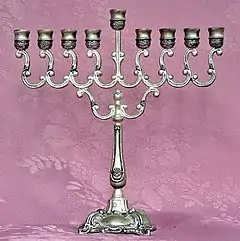
The three most commonly celebrated Jewish holidays are Rosh Hashanah, Yom Kippur and Hanukkah.[81] Passover and Yom Kippur in addition to Rosh Hashannah and Hanukkah are recognized as an optional state level holiday in Texas[82][83] All Jewish holidays start the night before, as that is when the Jewish day begins.
| Date | Name | Remarks |
|---|---|---|
| March 21 – April 24 (floating date) | Passover פסח | A seven- or eight-day festival in Judaism (seven days in Israel, eight outside of Israel), commemorating the Exodus of the Jews from Egypt. For Karaite Jews, Passover is the holiest day of the year and is the festival that marks the beginning of the year. Some Christian groups celebrate Passover instead of Easter. In many regions with large Jewish communities, schools close for all or part of Passover. |
| May 9 – June 12 (floating date) | Shavuot שבועות | A two-day (one in Israel) festival celebrating the receiving of the Torah at Sinai and the harvest season of the Land of Israel. Many people have the custom to eat dairy foods, specifically cheesecake. |
| September 5 – October 5 (floating date) | Rosh Hashanah ראש השנה | Observed by Jewish people. Traditional beginning of the Jewish High Holidays. It also celebrates the beginning of a new year on the Hebrew calendar. In regions with large Jewish populations, schools and universities may close on Rosh Hashanah. It is a widely accepted custom to dip an apple in honey on the first night. Unlike other holidays where the Diaspora (outside of Israel) celebrate extra days, this holiday is observed for two days everywhere. |
| September 14 – October 14 (floating date) | Yom Kippur יום כיפור | Observed by Jewish people.
This day marks the end of the Ten Days of Penitence that began with Rosh Hashanah. It is described in Leviticus as a "Sabbath of rest," and synagogue services begin the preceding sundown, resume the following morning, and continue to sundown. Orthodox and many Conservative Jews fast on Yom Kippur. In regions with large Jewish populations, schools and universities may close on Yom Kippur. |
| September 19 – October 19 (floating date) | Sukkot סוכות | A nine-day (eight in Israel) holiday celebrating the huts Jews lived in for forty years after the Exodus before getting to Israel. It also celebrates the cloud of glory that protected the Jews in the desert during the same period. Jews eat, and some sleep, in a special hut called a sukkah outside their home for the first seven days. Also, the 'four species' or 'Arba Minim', ארבע מינים, the Lulav לולב (palm frond), the Etrog אתרוג (citron), the Aravot ערבות (willow branches), and the Hadasim הדסים (myrtle branches), are shaken in the sukkah in the morning, as well as during prayers. The Seventh Day, known as Hoshanah Rabbah הושנה רבה is the last day of the season of repentance started on Rosh Hashanah and has extra prayers in addition to the extra holiday prayers. The Eighth day is known as Shemini Atzeret שמיני עצרת and is to some degree considered a different holiday. The ninth day (or part of the eighth in Israel) is known as Simchat Torah שמחת תורה and celebrates he finishing of one cycle of reading the Torah or bible, and includes much joyous singing and dancing with the Torah scrolls during prayers. |
| November 28 – December 27 (floating date) | Hanukkah חנוכה | An eight-day Jewish holiday commemorating the rededication of the Second Temple in Jerusalem at the time of the Maccabean Revolt of the 2nd century BC. Candelabras are lit, one candle on the first night and adding one candle per night. It is also a widely accepted custom to spin a top-like toy called a dreidel, and to give coins to the children. |
| February 23 – March 26 (floating date) | Purim פורים | A one-day holiday, celebrated the Jews being saved from a plot by Haman, the second-in-command to the Persian king, Achasverosh, or Xerxes, to exterminate every single Jew. It is generally celebrated by reading the Book of Esther in Synagogue the preceding night (which, like all Jewish holidays, is actually part of the holiday) and in the morning, giving charity, giving presents of food baskets to at least two friends, and having a celebratory feast. Unlike most other Jewish holidays (other than Hannukah), work is allowed including using electricity, and other prohibited actions on Sabbath, and other holidays. The day before (or the Thursday before, if Purim is on a Sunday) is a fast day commemorating the fast of Esther before she met with King Achashverosh. In Jerusalem, Purim is celebrated the day after the rest of the world. |
Islamic holidays

The major Islamic holidays of Ramadan, Eid al-Fitr, and Eid al-Adha have been recognized in the United States. Awareness of these holidays can be found in calendars published by major calendar manufacturers.[84][85][86] According to Al-Jazeera, schools in New York and Michigan (mainly Dearborn) may begin to close in observance of all Muslim holidays.[87]
| Date | Name | Remarks |
|---|---|---|
| depends on Islamic calendar | Ramadan | Ramadan (Arabic: رمضان Ramaḍān, IPA: [rɑmɑˈdˤɑːn];[variations] Persian: رَمَضان Ramazān; Urdu / Punjabi رَمْضان Ramzān; Turkish: Ramazan) is the ninth month of the Islamic calendar;[88] Muslims worldwide observe this as a month of fasting.[89] This annual observance is regarded as one of the Five Pillars of Islam.[90] The month lasts 29–30 days based on the visual sightings of the crescent moon, according to numerous biographical accounts compiled in the hadiths.[91][92] The word Ramadan comes from the Arabic root ramiḍa or ar-ramaḍ, which means scorching heat or dryness.[93] Fasting is fard ("obligatory") for adult Muslims, except those who are ill, traveling, pregnant, breastfeeding, diabetic or going through menstrual bleeding.[94] Fasting the month of Ramadan was made obligatory (wājib) during the month of Sha'aban, in the second year after the Muslims migrated from Mecca to Medina. |
| depends on Islamic calendar | Eid al-Fitr | Eid al-Fitr (Arabic: عيد الفطر ʻĪd al-Fiṭr, IPA: [ʕiːd al fitˤr], "festival of breaking of the fast"), also called Feast of Breaking the Fast, the Sugar Feast, Bayram (Bajram), the Sweet Festival[95] and the Lesser Eid, is an important religious holiday celebrated by Muslims worldwide that marks the end of Ramadan, the Islamic holy month of fasting (sawm). The religious Eid is a single day and Muslims are not permitted to fast on that day. The holiday celebrates the conclusion of the 29 or 30 days of dawn-to-sunset fasting during the entire month of Ramadan. The day of Eid, therefore, falls on the first day of the month of Shawwal. This is a day when Muslims around the world show a common goal of unity. The date for the start of any lunar Hijri month varies based on the observation of new moon by local religious authorities, so the exact day of celebration varies by locality. However, in most countries, it is generally celebrated on the same day as Saudi Arabia(lunar calendar). |
| depends on Islamic calendar | Eid al-Adha | Eid al-Adha (Arabic: عيد الأضحى ʿīd al-aḍḥā [ʕiːd ælˈʔɑdˤħæ] meaning "Festival of the sacrifice"), also called the Feast of the Sacrifice, the Major Festival,[96] the Greater Eid, Kurban Bayram (Turkish: Kurban Bayramı; Bosnian: kurban-bajram), Eid e Qurban (Persian: عید قربان) or Bakr'Eid (Urdu: بکرا عید), is the second of two religious holidays celebrated by Muslims worldwide each year. It honors the willingness of Abraham (Ibrahim) to sacrifice his young first-born son Ishmael (Ismail)a as an act of submission to God's command, before God then intervened to provide Abraham with a lamb to sacrifice instead.[97] In the lunar-based Islamic calendar, Eid al-Adha falls on the 10th day of Dhu al-Hijjah and lasts for four days.[98] In the international Gregorian calendar, the dates vary from year to year, drifting approximately 11 days earlier each year. |
Holidays with other cultural or historical significance
Confederate States of America
The following holidays memorialize the historic Confederate States of America from the American Civil War:
- Confederate Memorial Day is a public holiday observed by Alabama, Florida, Kentucky, Mississippi, South Carolina, Louisiana and Texas and an unofficially observed holiday in some other states. It is often in late April to align with the final surrender of the last Confederate Army. Texas observes Confederate Heroes Day.
- Confederate History Month has been declared at least once in Alabama, Florida, Georgia, Louisiana, Mississippi, Texas, and Virginia as well as by various cities, usually in April to augment Confederate Memorial Day.
- Robert E. Lee Day (on or around Lee's Jan 19 birthday) is still observed in Alabama and Mississippi combined with Martin Luther King Jr. Day, the only remaining states to do so.[99] It is officially recognised in Florida, but is not widely observed there.[100]
- Arkansas combined the observance of Robert E. Lee Day with Martin Luther King Jr. Day in 1985.[101] In 2017, it passed a law removing Lee's name from the January holiday and instead establishing a state memorial day on the second Saturday of October in honor of Lee.[102]
Drinking holidays

According to the National Institutes of Health, about 86% of the population over 18 drinks alcohol recreationally or socially.[103] In the United States, the holidays that are considered the most "festive" are generally regarded as some of the "most drunken holidays." Celebrations usually revolve around barbecues and beer. Although many of these holidays lack any official status, they are generally observed by the drinking culture for the fact that these holidays revolve around drinking. One measurement of the popularity of these holidays is the amount of alcohol purchased for the occasion. One survey names New Year's Eve as the holiday on which the most alcohol is consumed based on sales.[104] While many holidays are listed, some are generally notable for their drinking requirement while others are known for abstinence.[105]
African American holidays
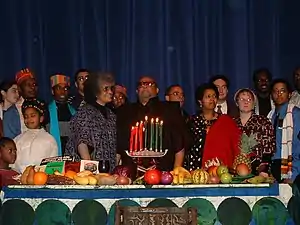
African Americans make up about 12% of the U.S. population. While some customs have come from abroad, many of the customs were developed inside the United States. Kwanzaa, for example, is a custom that has greatly influenced American culture originating from the "turbulent 60's" when race relations in the United States were at their lowest.[106] Most of the newer holidays revolve around a particular civil rights activist and have recently gained attention from city and state-level governments. At the federal level, there are only three national holidays named for a person, and one of those honors 20th century African American Martin Luther King Jr.; the other two are Washington's Birthday (for George Washington, one of the original American citizens of 1776) and Columbus Day (for Italian Christopher Columbus' European "discovery" of the Americas in 1492).
| Date | Name[107] | Remarks |
|---|---|---|
| December 26 – January 1 | Kwanzaa | Kwanzaa is a week-long celebration held in the United States and in other nations of the Western African diaspora in the Americas. The celebration honors African heritage in African-American culture, and is observed from December 26 to January 1, culminating in a feast and gift-giving.[108] Kwanzaa has seven core principles (Nguzo Saba). It was created by Maulana Karenga and was first celebrated in 1966–67. |
| January 15–21 (floating Monday) | Martin Luther King Jr. Day | Martin Luther King Jr. Day is the only federal holiday marking the birthday of an African American. It is observed on the third Monday of January each year, which is around King's birthday, January 15. |
| February 1–29 | Black History Month | Also known as the "African American History Month" which was set aside as an observance of important leaders of the African diaspora. |
| February 4 or December 1 | Rosa Parks Day | Currently observed in the states of California, Missouri, and Ohio to honor the late civil rights leader Rosa Parks. Rosa Parks Day was created by the California State Legislature and first celebrated February 4, 2000.[109] The holiday was first designated in Ohio championed by Joyce Beatty, advocate who helped Ohio's legislation pass to honor the late leader.[110] In 2015, Missouri has declared Rosa Parks Day a legal holiday. |
| March 10 | Harriet Tubman Day | Commemorates anti-slavery activist Harriet Tubman for her accomplishments. Occurs two days after International Women's Day. |
| April 16 (DC) | Emancipation Day | Currently observed in Washington, DC, Mississippi, Texas (as Juneteenth), Kentucky, and the U.S. Virgin Islands, in observance of the emancipation of slaves of African descent. It is also observed in other areas in regard to the abolition of serfdom or other forms of servitude. |
| May 19 | Malcolm X Day | Currently observed in Berkeley, California, and Illinois, this holiday honors Malcolm X as a civil rights leader as a legal holiday with offices closed. Various municipalities such as Atlanta, Philadelphia, and Washington, DC have festivals commemorating the civil rights leader. |
| June 19 | Juneteenth | Juneteenth is a holiday that commemorates the announcement of the abolition of slavery in Texas in June 1865, and more generally the emancipation of African-American slaves throughout the Confederate South. Celebrated on June 19, the term is a portmanteau of June and nineteenth[111][112] and is recognized as a state holiday or special day of observance in most states. |
| June 8–14 (floating Sunday) | African New Year | Celebrated as the "Odunde Festival" as a one-day festival and mostly a street market catered to African-American interests and the African diaspora. It is derived from the tradition of the Yoruba people of Nigeria in celebration of the new year. It is centered at the intersection of Grays Ferry Avenue and South Street in Philadelphia, Pennsylvania. |
Other traditional and informal holidays
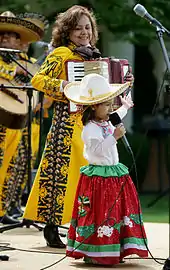
In addition to the federal/national holidays, many religious, ethnic, and other traditional holidays populate the calendar, as well as lighter celebrations. These are rarely observed by businesses as holidays (Except for Easter and most often also on Good Friday);[10] indeed, many are viewed as opportunities for commercial promotion. Because of this commercialization, some critics apply the deprecatory term Hallmark holiday to such days, after the Hallmark greeting card company.
| Date | Name | Remarks |
|---|---|---|
| February 2 | Groundhog Day | The day on which folklore states that whether or not a local groundhog casts a shadow determines if the spring season will arrive early or on time. |
| April 1 | April Fools' Day | A day that people commonly play tricks or jokes on family, friends, and co-workers, especially in English-speaking nations. Sometimes called "the Feast of All Fools" as a play on the feast days of saints; there is no evidence the holiday has any Christian religious origins. |
| April 22 (varies by location and observance) | Earth Day | A celebration of environmentalism. |
| April 24–30 (floating Friday) | Arbor Day | A day for planting trees. |
| May 1 | May Day | In most other countries, May 1 is International Workers' Day, the equivalent of Labor Day, which commemorates the labor movement and the ultimate triumph of socialism over capitalism. This theme borrows from the pagan origins of May Day which emphasized the change in season and the triumph of the warm sun over the cold winter. The holiday is often celebrated with parades and protests for workers' rights and other broad social issues. |
| May 5 | Cinco de Mayo | Primarily a celebration of Mexican culture by Mexican-Americans living in the United States. Although this is the anniversary of the victory of the Mexican Army over the French at the Battle of Puebla in 1862, Cinco de Mayo is far more important in the United States than in Mexico itself, often celebrated even by non-Mexican-Americans. Additionally, this "holiday" is often mistaken by Americans as being Mexican Independence Day, which is actually observed on September 16. |
| May 8–14 (floating Sunday) | Mother's Day | Honors mothers and motherhood (made a federal holiday by Presidential order, although most federal agencies are already closed on Sundays) |
| June 14 | Flag Day | Commemorates the adoption of the flag of the United States, in 1777. |
| June 27 | Helen Keller Day | Commemorates the achievements of Helen Keller and the blind. |
| June 15–21 (floating Sunday) | Father's Day | Honors fathers and fatherhood. |
| July 24 | Pioneer Day | Observed in Utah and some other areas to commemorate the arrival of pioneers of The Church of Jesus Christ of Latter-day Saints to the Salt Lake Valley in 1847. |
| August 26 | Women's Equality Day | Celebrates the fight for, and progress towards, equality for women. Established by the United States Congress in 1971 to commemorate two anniversaries: Passage of the Nineteenth Amendment to the United States Constitution ensuring Woman Suffrage in 1920 and a nationwide demonstration for equal rights, the Women's Strike for Equality, in 1970. |
| September 11 | Patriot Day | Commemorates the response to the attacks on the World Trade Center (New York City), The Pentagon (Washington, DC), and United Airlines Flight 93 in 2001. |
| September 17 | Constitution/Citizenship Day | Commemorates the adoption of the Constitution of the United States. |
| October | Oktoberfest | 16-day folk festival drinking beer. Modeled after the original Oktoberfest from Munich, Germany. |
| November 2–8 (floating Tuesday) | Election Day or Democracy Day | Observed by the federal and state governments in applicable years; a legal holiday in some states. |
| November 23–29 (floating Friday) | Black Friday | Traditionally the beginning of the Christmas shopping season in the United States. "Black Friday" is not a holiday under that name, but California and some other states observe "The Day After Thanksgiving" as a holiday for state government employees. Virtually all schools, colleges, and universities are also closed, along with many non-retail private sector businesses. Federal government offices, post offices, and federally chartered banks must open on Black Friday (unless the President issues an executive order or proclamation allowing them to close). |
| December 7 | Pearl Harbor Remembrance Day | Day to remember the attack on Pearl Harbor by the Japanese on December 7, 1941. |
| December 31 | New Year's Eve | Final Day of the Gregorian year. Usually accompanied by much celebration, such as party and fireworks. Virtually every company and retail outlet closes early, except for stores that sell alcoholic beverages and party supplies. |
Other notable holidays

- Black Friday (busy shopping day where stores lower prices the Friday after Thanksgiving, traditionally the start of the Christmas shopping season)
- Cyber Monday (the equivalent of Black Friday, except online, the Monday after Black Friday)
- Oktoberfest (celebrated most often in areas with contemporary or historic populations of German heritage)
- Opening Day (first week of April; the beginning of the Major League Baseball season and an unofficial indication that summer is approaching)
- Spring break (one week in late winter or early spring that schools are off)
- Summer vacation (summer months in which schools are off)
- Super Bowl Sunday (the first Sunday in February; the day of the National Football League's championship; festivities generally including in-home parties and watching the game on television with beverages and snacks)
- National Football Hangover Day – Monday after the Super Bowl.[113]
See also
References
- Massachusetts, for example, forbids most retailers from opening on Thanksgiving and Christmas: Attorney General's Office, "Sunday and Holiday Openings" "Office of Attorney General Maura Healey". Archived from the original on August 30, 2016. Retrieved October 13, 2014.
- "Federal Holidays". Opm.gov. Retrieved March 3, 2014.
- Uniform Monday Holiday Act
- "State Holidays". Infoplease.com. Retrieved March 3, 2014.
- "Rosa Parks to be honored by Missouri on Feb 4th".
- "Illinois designates May 19 as Malcolm X Day". May 20, 2015.
- "2014 Diversity Holidays". Archived from the original on October 21, 2014.
- Enten, Harry J. (December 22, 2012). "Christmas may be on the cards, but is it the most popular American holiday?". The Guardian.
- "Hours". Mall of America. Retrieved March 3, 2014.
- "Optional Time-Off Benefits You Can Give Your Employees | BizFilings Toolkit". Toolkit.com. May 25, 2012. Retrieved March 3, 2014.
- "Holiday Spending Totals in Billions, 2013–2014".
- "Ever popular: 90 percent of all Americans celebrate Christmas".
- Lipka, Michael (2015). "Five Facts About Christmas in America". Pew Research Center. Retrieved November 30, 2016.
About nine-in-ten Americans (92%) and nearly all Christians (96%) say they celebrate Christmas, according to a 2013 Pew Research Center survey.
- Newport, Frank (2008). "In the U.S., Christmas Not Just for Christians". Gallup. Retrieved November 20, 2016.
Despite the fact that only a little more than 80% of Americans identify with a Christian faith, 93% of those interviewed in a recent USA Today/Gallup poll indicate that they celebrate Christmas.
- Jones, Jeffrey M. (2005). "Christmas a Good Time for Most Americans". Gallup. Retrieved November 30, 2016.
The Dec. 16–18 poll finds that 96% of all U.S. adults celebrate Christmas, a percentage that has been consistent over the past decade.
- "13 percent Americans don't plan to celebrate Thanksgiving". Archived from the original on November 13, 2016. Retrieved January 20, 2017.
- Gillespie, Mark (2000). "Americans Celebrate Thanksgiving With Special Regard for Families". Gallup. Retrieved November 30, 2016.
More than nine out of 10 Americans will celebrate the holiday with family and friends.
- "Thanksgiving Holiday Period Air Travel 24 million expected to fly over Thanksgiving holiday period – eTurboNews.com". September 20, 2011. Archived from the original on September 20, 2011. Retrieved September 26, 2019.
- "Turkey Facts".
- "Turkey History & Trivia".
- "Mother's Day Trends".
- Lavingia, Christina (2016). "How Americans Celebrate Mother's Day, in Five Charts". San Francisco Chronicle. Retrieved November 30, 2016.
Nearly 16 percent of adults surveyed by Prosper Insights & Analytics don't expect to celebrate the holiday.
- "Restaurants expect strong Mother's Day". May 10, 2013.
- "Mother's Day Church Attendance Third Highest After Easter, Christmas; Father's Day Last".
- Harper, Jennifer (2015). "80 Percent of Americans Celebrate Easter – and Spend $16.4 Billion on Peeps, Paas and Ham". The Washington Times. Retrieved November 30, 2016.
80 percent of Americans will celebrate Easter.
- "Are You Celebrating Easter This Year?". Statista. 2016. Retrieved November 30, 2016.
This year, 80.6 percent of respondents in the United States said they are planning to celebrate Easter.
- Carlson, Darren K. (2001). "Americans Celebrate the Fourth of July". Gallup. Retrieved November 16, 2016.
Nearly eight in 10 Americans (78%) say they will attend a picnic or barbecue, the most popular Fourth of July activity among those tested. Most Americans, 76%, will celebrate with family. Other common activities include displaying an American flag (66%) and attending fireworks displays (63%).
- "What America Spends on Fireworks for July 4".
- McCarthy, Niall (2015). "The Numbers Behind Father's Day Spending in the U.S." Forbes. Retrieved November 30, 2016.
75.4 percent of Americans are planning to celebrate Father's Day.
- "Ties could be as popular a gift as ever this Father's Day".
- Roberts, Amy (2015). "Halloween 2015 by the Numbers". CNN. Retrieved November 30, 2016.
64: Percent of Americans who plan to celebrate Halloween this year.
- "Total Halloween Spending Set to Dip This Year". MarketingCharts. 2015. Retrieved November 30, 2016.
Almost two-thirds (64%) of American adults plan to celebrate Halloween or participate in Halloween activities this year, reports the NRF in a recent study.
- "NCA predicts $2.6B in Halloween candy sales".
- "Halloween in the U.S."
- Soergel, Andrew (2015). "Valentine's Day Spending to Approach $19 Billion". U.S. News & World Report. Retrieved November 30, 2016.
More than half (54.9 percent) of Americans at least 18 years old said they plan to celebrate Valentine's Day this year, though the percentage of those who recognize the holiday drops off after the age of 44, according to a survey conducted by the National Retail Federation.
- "Valentine's Day Floral Statistics". www.aboutflowers.com. Archived from the original on February 25, 2015. Retrieved December 5, 2016.
- Kiernan, John S. (2016). "St. Patrick's Day 2016 by the Numbers". WalletHub. Retrieved November 30, 2016.
51.2% of Americans plan to celebrate St. Patrick's Day in 2016.
- Rapoza, Kenneth (2012). "In Survey, Most Americans Not Celebrating New Year's Eve". Forbes. Retrieved November 30, 2016.
37 percent plan to stay up to welcome in 2013 while 23 percent say they will entertain at home.
- Johanson, Mark (2012). "New Years Eve by the Numbers". International Business Times. Retrieved November 30, 2016.
45: The percent of American adults that say they will make a New Year's resolution.
- "Happy St. Patrick's Day: Top 10 Drunkest Holidays". Time. March 17, 2011.
- "Holidays are a peak time for alcohol sales".
- "Employment Situation Summary".
- "SHRM: 2015 Holiday Schedules". November 10, 2014.
- "Among Wealthy Nations U.S. Stands Alone in its Embrace of Religion". Pew Global Attitudes Project. December 19, 2002. Retrieved January 1, 2007.
- ""Nones" on the Rise". The Pew Forum. October 9, 2012. Retrieved December 29, 2012.
- US Census Bureau (September 30, 2011). "Table 75. Self-Described Religious Identification of Adult Population: 1990, 2001 and 2008, The methodology of the American Religious Identification Survey (ARIS)". US Census Bureau 2012 Statistical Abstract. Archived from the original on December 25, 2007. Retrieved February 11, 2012.
- "The Pew Forum on Religion & Public Life – Asian Americans: A Mosaic of Faiths". Pewforum.org. July 19, 2012. Retrieved December 29, 2012.
- "What will be open Christmas Day". Archived from the original on February 22, 2014. Retrieved February 16, 2014.
- "Good Friday in United States". timeanddate.com. Retrieved September 3, 2015.
- "Stock Market Holidays". money-zine.com. Retrieved September 3, 2015.
- Department of Information Technology. "About Connecticut". CT.gov. Retrieved March 3, 2014.
- "Delaware – Office of Management and Budget – State of Delaware Holidays". Delawarepersonnel.com. Archived from the original on January 18, 2012. Retrieved March 3, 2014.
- "Florida Laws: FL Statutes – Title XXXIX Commercial Relations Section 683.01 Legal holidays. – Florida Attorney Resources – Florida Laws". Law2.onecle.com. May 31, 2013. Archived from the original on February 2, 2014. Retrieved March 3, 2014.
- "Hawaii State Holidays for 2014". Miraclesalad.com. Retrieved March 3, 2014.
- "Secretary of State: 2011 Indiana State Holidays". In.gov. Retrieved March 3, 2014.
- Archived April 18, 2007, at the Wayback Machine
- Sandra G. Gillen, CPPB. "2014 State Holidays Calendar Observed by OSP". Doa.louisiana.gov. Archived from the original on February 1, 2014. Retrieved March 3, 2014.
- "The Official Web Site for The State of New Jersey | State Holidays". Nj.gov. Retrieved March 3, 2014.
- "N.C. State Government Holiday Schedule for 2013 and 2014". Ic.nc.gov. Retrieved March 3, 2014.
- "North Dakota State Holidays 2014". The Holiday Schedule. Retrieved March 3, 2014.
- "Official State Holidays". TN.gov. Archived from the original on May 29, 2013. Retrieved March 3, 2014.
- Jean Mead, How and why Do Hindus Celebrate Divali?, ISBN 978-0237534127
- "Guam Public Holidays 2012 (Oceania)". qppstudio.net. Archived from the original on September 24, 2015. Retrieved September 3, 2015.
- "US Virgin Islands Public Holidays 2012 (Americas/Caribbean)". qppstudio.net. Archived from the original on September 24, 2015. Retrieved September 3, 2015.
- "Public Holidays in Puerto Rico in 2015". topuertorico.org. Retrieved September 3, 2015.
- "The White House Easter Egg Roll". Archived from the original on April 10, 2014. Retrieved April 10, 2014.
- "Diwali Goes Mainstream". Huffington Post. October 25, 2011.
- "Diwali 2013 in the USA and UK". November 4, 2013.
- "Color Me Rad 5K – 2 Million Fans with New Color Blaster". Archived from the original on March 2, 2014. Retrieved February 15, 2014.
- "Res 1863–2013".
- "USA: Hindus laud New York City Council for resolution on Diwali holiday in City schools". Archived from the original on February 18, 2014.
- "Diwali".
- "6 things you should know about Diwali".
- Yudit Greenberg, Encyclopedia of Love in World Religions, Volume 1, ISBN 978-1851099801, p. 212
- The New Oxford Dictionary of English (1998) ISBN 019861263X – p. 874 "Holi /'həʊli:/ noun a Hindu spring festival ...".
- Ebeling, Karin (2010), Holi, an Indian Festival, and its Reflection in English Media; Die Ordnung des Standard und die Differenzierung der Diskurse: Akten des 41. Linguistischen Kolloquiums in Mannheim 2006, 1, 107, ISBN 978-3631599174
- The New Oxford Dictionary of English (1998) ISBN 019861263X – p. 540 "Diwali /dɪwɑːli/ (also Divali) noun a Hindu festival with lights...".
- Diwali Encyclopædia Britannica (2009)
- Diwali – Celebrating the triumph of goodness Hinduism Today (2012)
- Vera, Zak (2010). Invisible River: Sir Richard's Last Mission. ISBN 978-1-4389-0020-9. Retrieved October 26, 2011.
First Diwali day called Dhanteras or wealth worship. We perform Laskshmi-Puja in evening when clay diyas lighted to drive away shadows of evil spirits.
- "Jewish Holidays".
- "Rosh Hashanah".
- "Holidays – Tablet Magazine – Jewish News and Politics, Jewish Arts and Culture, Jewish Life and Religion". tabletmag.com. Retrieved September 3, 2015.
- "Major Islamic Holidays".
- "Eid al-Fitr".
- "Eid al-Adha".
- "New York Schools Could Get Muslim Holidays".
- BBC – Religions. Retrieved July 25, 2012
- "The Muslim World Observes Ramadan". Power Text Solutions. 2012. Retrieved July 28, 2012.
- "Schools – Religions". BBC. Retrieved July 25, 2012.
- Bukhari-Ibn-Ismail, AbdAllah-Muhammad. "Sahih Bukhari – Book 031 (The Book of Fasting), Hadith 124". hadithcollection.com. Archived from the original on June 13, 2012. Retrieved July 25, 2012.
- Muslim-Ibn-Habaj, Abul-Hussain. "Sahih Muslim – Book 006 (The Book of Fasting), Hadith 2378". hadithcollection.com. Archived from the original on January 15, 2013. Retrieved July 25, 2012.
- Muslim-Ibn-Habaj, Abul-Hussain. "Sahih Muslim – Book 006 (The Book of Fasting), Hadith 2391". hadithcollection.com. Archived from the original on June 12, 2018. Retrieved July 25, 2012.
- Fasting (Al Siyam) – الصيام – p. 18, el Bahay el Kholi, 1998
- Elias, Jamal J. (1999). Islam. Routledge. p. 75. ISBN 978-0-415-21165-9.
- Elias, Jamal J. (1999). Islam. Routledge. p. 75. ISBN 978-0-415-21165-9. Retrieved October 24, 2012.
- Diversity Calendar: Eid al-Adha Archived October 19, 2012, at the Wayback Machine, University of Kansas Medical Center
- "BBC – Religion & Ethics – Eid el Adha". September 7, 2009. Retrieved December 25, 2016.
- Little, Becky (January 13, 2017). "The Controversial History of Martin Luther King Day". National Geographic. Retrieved August 22, 2018.
- Mettler, Katie (January 19, 2016). "Today in Florida, it's Robert E. Lee Day". Tampa Bay Times. Retrieved August 22, 2018.
- "Arkansas Ends Robert E. Lee-Martin Luther King Jr. Holiday". NBC News. March 22, 2017. Retrieved April 19, 2017.
- "Arkansas lawmakers vote to remove Robert E. Lee from holiday honoring MLK". Politico. Associated Press. March 17, 2017. Retrieved April 19, 2017.
- "Alcohol facts and statistics".
- "Top 10 Drunkest Holidays". Time. March 17, 2011.
- "Ranking America's drinking holidays". May 4, 2015.
- "Celebrating the Kwanzaa Holiday and Understanding its Impact on Race Relations".
- "African-American Holidays, Festivals, and Celebrations".
- "Why Kwanzaa Video". Maulana Karenga.
- "ACR 116 Assembly Concurrent Resolution – CHAPTERED". ca.gov. Retrieved September 3, 2015.
- Ohio's Rosa Parks Day Placed into National Congressional Record, archived from the original on November 17, 2011
- "Juneteenth Celebrated in Coachella". Black Voice News. June 22, 2011. Archived from the original on January 22, 2012.
- "Juneteenth". Merriam Webster Dictionary. Retrieved May 30, 2013.
- "NATIONAL FOOTBALL HANGOVER DAY – The Day After the Big Game". National Day Calendar. January 30, 2019. Retrieved February 2, 2019.
External links
- U.S. Department of Commerce Federal Holiday Calendar
- Text of Federal Holiday Legislation
- Bizarre American Holidays – a comprehensive compilation of special recognition given both to months and individual days. Unfortunately, the origins of the commemorations aren't provided.
- Infoplease: State Holidays
- Federal Holidays: Evolution and Application, CRS Report for Congress, 98-301 GOV, updated February 8, 1999, by Stephen W. Stathis